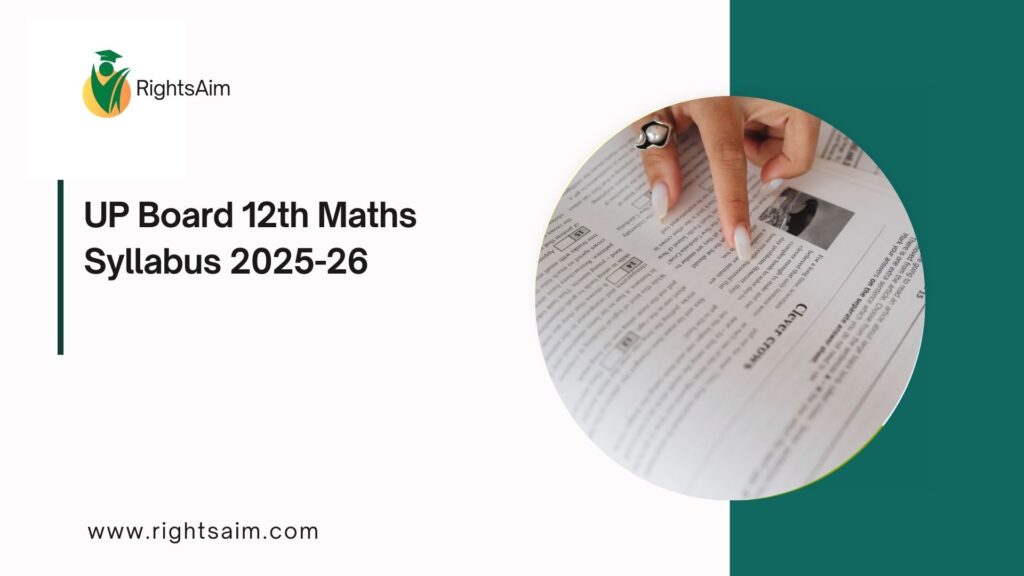The Uttar Pradesh Madhyamik Shiksha Parishad (UPMSP) has released the Class 12 Mathematics syllabus for 2025-26, which is applicable for the UP Board Intermediate (12th) board exams.
Mathematics is a critical subject especially for students in the Science and Commerce streams. A strong command on the syllabus helps in board exams and also feeds into competitive exam preparation (engineering, state exams, etc.). The syllabus now is organized into 5 units + internal assessment / project work, with clear weightage for each unit.

🏷 Marks Distribution & Exam Pattern
Below is the weightage / marks distribution for each unit according to the latest syllabus:
| Unit | Marks | Key Focus / Remarks |
|---|---|---|
| Relations & Functions | 10 | Fundamental concepts of relations, functions, inverses, etc. |
| Algebra | 15 | Matrices, determinants, inversion, solving linear systems |
| Calculus | 44 | Largest chunk — continuity, differentiation, integration, applications, differential equations |
| Linear Programming & Vectors | 18 | Vector algebra, 3D geometry, linear inequalities, optimization |
| Probability | 5 | Basic probability, conditional probability, Bayes’ theorem |
| Internal Assessment / Project Work | 8 | Students must complete project work or internal tasks |
Total = 100 marks (theory). There is no separate practical component for Mathematics under UPMSP for Class 12.
The exam is expected to be of 3 hours duration (180 minutes) for the full theory paper.
📚 Unit-Wise Topics & Outline
Here’s a detailed breakdown of topics under each unit as per the syllabus:
1. Relations & Functions (10 Marks)
Types of relations: reflexive, symmetric, transitive, equivalence relations
Functions: one-one (injective), onto (surjective), bijective
Inverse functions and composition of functions
Binary operations and their properties
Graphical representation of functions
Inverse trigonometric functions: domain, range, principal branches
2. Algebra (15 Marks)
Matrices: types (square, diagonal, identity, symmetric, skew symmetric, zero), basic operations
Determinants: properties, minors, and cofactors
Inverse of a matrix using elementary transformations
Solving systems of linear equations (Cramer’s rule, matrix inversion method)
3. Calculus (44 Marks)
This is the heaviest unit in terms of marks and importance:
Continuity & Differentiability
Limits and continuity
Differentiability, derivative of composite, implicit, parametric functions
Derivatives of inverse functions
Second order derivatives
Applications of Derivatives
Increasing / decreasing functions
Tangents and normals
Maxima and minima problems
Integrals
Indefinite integrals (standard forms)
Methods of integration: substitution, parts, partial fractions, by parts
Definite integrals and their properties
Applications of Integrals
Area under the curve
Area between two curves
Differential Equations
Formation and solutions of first order differential equations (separable, linear)
Applications of differential equations in real life
4. Linear Programming & Vectors (18 Marks)
Vectors & 3D Geometry
Vector addition, scalar multiplication
Dot product, cross product
Lines and planes: direction ratios, parametric equations
Linear Programming
Formulation of linear inequalities
Graphical method to solve optimization problems (maximization / minimization)
5. Probability (5 Marks)
Conditional probability
Independent events
Bayes’ theorem
Random variable: binomial distribution, mean and variance
6. Internal Assessment / Project Work (8 Marks)
Students will be given a mathematical project or internal assignment.
The project should integrate concepts from the syllabus and their applications.
Emphasis is on reasoning, interpretation, and presentation.
📄 How to Download the Official PDF
You can download the complete syllabus PDF from the UPMSP official website under the Syllabus section: upmsp.edu.in → Syllabus list → Class 12 Mathematics
Also, many education portals provide direct PDF links with the updated 2025-26 syllabus.
🧾 Key Preparation Tips
Focus on Calculus: Since it carries the most weight (44 marks), ensure strong conceptual clarity and plenty of practice.
Time management: Allocate your study time in proportion to marks—spend more time on calculus, moderate on algebra, relations, vectors.
Practice by unit: Solve sample / previous year questions unit by unit to build confidence.
Work on Project / Internal early: Don’t wait till the end; good projects can help bring scoring advantage.
Mock tests & previous papers: Helps understand the exam pattern, question types, and speed.
Revision strategy: Keep formula sheets, summary notes for quick last-minute revisions.
Clear doubt in fundamentals (like matrix operations, derivatives, integrations) before moving to advanced topics.
✅ Final Thoughts
The UP Board Class 12 Mathematics syllabus 2025-26 is comprehensive and well balanced across conceptual and application elements. With five major units and a valuable internal assessment component, the syllabus aims to test depth and understanding.
Understanding the marks distribution, topic weightage, and structured plan can help students prepare efficiently and smartly. Make sure you download the official PDF from UPMSP and align your revision strategy with the syllabus.


